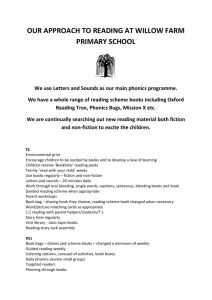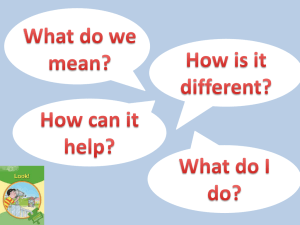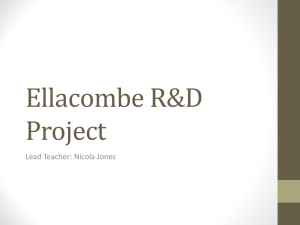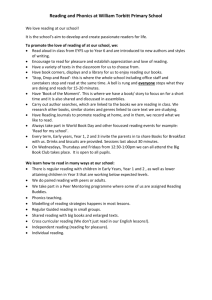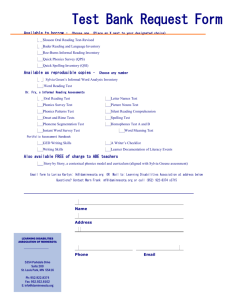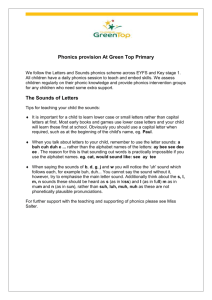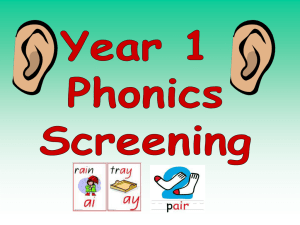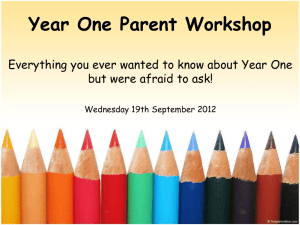Reading-and-Phonics
advertisement
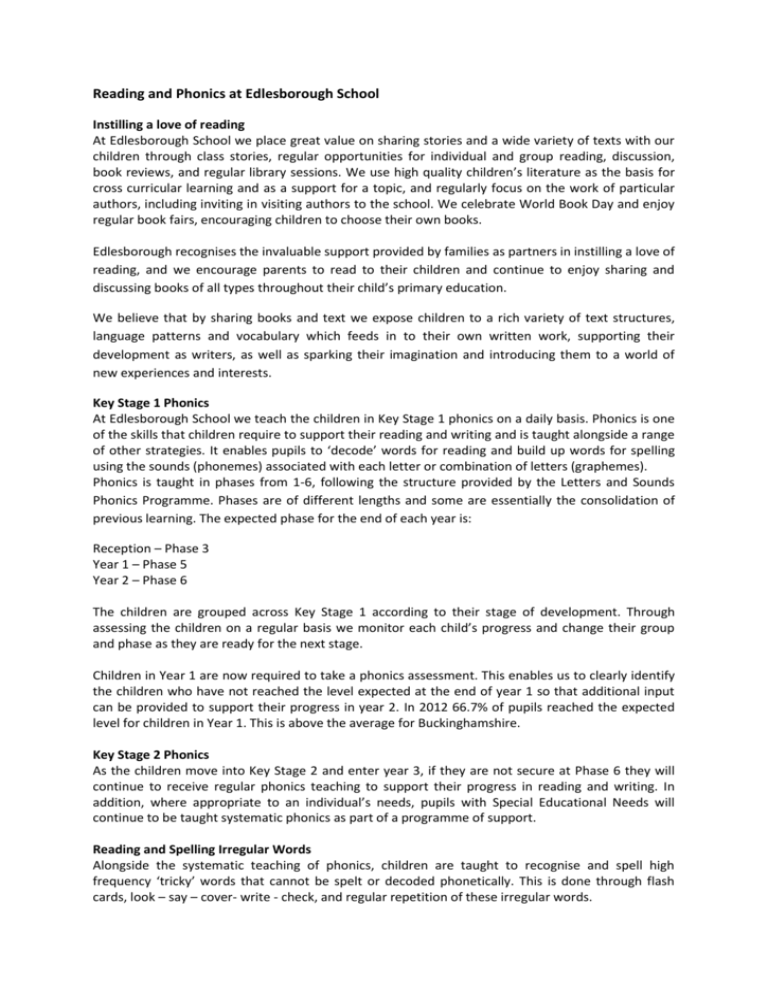
Reading and Phonics at Edlesborough School Instilling a love of reading At Edlesborough School we place great value on sharing stories and a wide variety of texts with our children through class stories, regular opportunities for individual and group reading, discussion, book reviews, and regular library sessions. We use high quality children’s literature as the basis for cross curricular learning and as a support for a topic, and regularly focus on the work of particular authors, including inviting in visiting authors to the school. We celebrate World Book Day and enjoy regular book fairs, encouraging children to choose their own books. Edlesborough recognises the invaluable support provided by families as partners in instilling a love of reading, and we encourage parents to read to their children and continue to enjoy sharing and discussing books of all types throughout their child’s primary education. We believe that by sharing books and text we expose children to a rich variety of text structures, language patterns and vocabulary which feeds in to their own written work, supporting their development as writers, as well as sparking their imagination and introducing them to a world of new experiences and interests. Key Stage 1 Phonics At Edlesborough School we teach the children in Key Stage 1 phonics on a daily basis. Phonics is one of the skills that children require to support their reading and writing and is taught alongside a range of other strategies. It enables pupils to ‘decode’ words for reading and build up words for spelling using the sounds (phonemes) associated with each letter or combination of letters (graphemes). Phonics is taught in phases from 1-6, following the structure provided by the Letters and Sounds Phonics Programme. Phases are of different lengths and some are essentially the consolidation of previous learning. The expected phase for the end of each year is: Reception – Phase 3 Year 1 – Phase 5 Year 2 – Phase 6 The children are grouped across Key Stage 1 according to their stage of development. Through assessing the children on a regular basis we monitor each child’s progress and change their group and phase as they are ready for the next stage. Children in Year 1 are now required to take a phonics assessment. This enables us to clearly identify the children who have not reached the level expected at the end of year 1 so that additional input can be provided to support their progress in year 2. In 2012 66.7% of pupils reached the expected level for children in Year 1. This is above the average for Buckinghamshire. Key Stage 2 Phonics As the children move into Key Stage 2 and enter year 3, if they are not secure at Phase 6 they will continue to receive regular phonics teaching to support their progress in reading and writing. In addition, where appropriate to an individual’s needs, pupils with Special Educational Needs will continue to be taught systematic phonics as part of a programme of support. Reading and Spelling Irregular Words Alongside the systematic teaching of phonics, children are taught to recognise and spell high frequency ‘tricky’ words that cannot be spelt or decoded phonetically. This is done through flash cards, look – say – cover- write - check, and regular repetition of these irregular words. Reading for Meaning Children learn how to decode and recognise individual words through applying phonics knowledge, sight recognition, breaking down words into syllables and recognising words within words. Above all children are encouraged to read for meaning and to think about whether what they have read makes sense. A variety of techniques support this including use of pictures to help with understanding, the context of a story or text, the meaning of the rest of the sentence, the use of punctuation to help with meaning. As children grow in confidence with their reading they will be encouraged to infer meaning from the text, to think ahead and make predictions and to give their opinions and responses to stories and texts, referring to the text to support their ideas. Reading Schemes Edlesborough provides a range of texts for children at different stages in their reading development using a colour book band system to guide choices. Early readers are provided with appropriate books from a range of reading schemes, both fiction and non-fiction, to ensure that they have opportunity to consolidate and widen their experience and understanding at a particular level, moving on to the next stage as appropriate Early Years Children in Reception are read an abundance of stories, rhymes and poems to support their learning across the curriculum. When a child can confidently blend and segment words with 3 sounds they begin to take reading books home. Children are listened to at least once a week in school and take two books home to share. Tricky words, learnt within the phonics sessions, are taken home on word cards to aid sight recognition. Word building skills are practiced during reading times and regular assessment ensures children move on as appropriate. Library books are also taken home weekly, the choice of book being determined by the child Key Stage 1 Children in Year 1 continue the pattern established in Early Years; they are listened to at least weekly and take books home to share twice a week. As children become more confident, guided reading takes place in addition to individual reading and reading skills are taught in a group. In Year 2 guided reading takes place on a daily basis with reading skills taught at the level appropriate for the group. Children select their own reading book to share at home from a wide variety of texts including fiction and non fiction, and change their books whenever they have finished their book. Children requiring additional support are listened to on an individual basis and books are selected from the appropriate colour bands. Key Stage 2 Most children enter KS2 as confident readers and we encourage them to read regularly as individuals from a wide range of books from their classroom, the school library or from home. Children record what they have read on individual reading records and share their opinions in book reviews. Children also read regularly as a group or class, discussing their understanding and opinion of the texts that they are reading and identifying techniques used by the author for effect. SEND Pupils with special educational needs are supported in their reading by additional opportunities for individual or small group reading, and by intervention programmes designed to target their particular need. The effectiveness of these intervention programmes are carefully monitored to ensure a good impact on learning.
